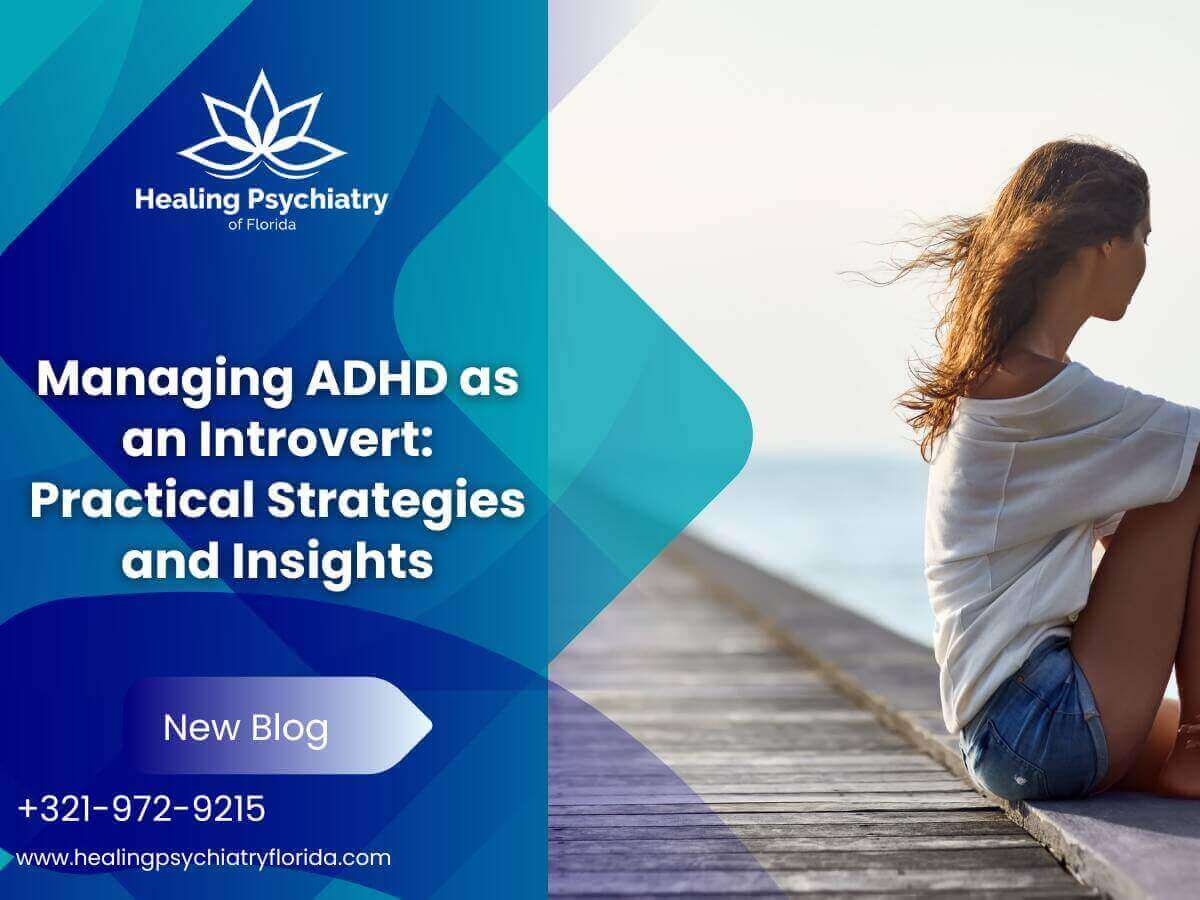Imagine sitting in a bustling office, the hum of conversation and ringing phones filling the air. For someone with Attention Deficit Hyperactivity Disorder (ADHD), this environment can feel overwhelming. Now, picture that person as an introvert who craves solitude and quiet. The constant stimulation becomes more than a distraction—it’s a barrier to focus and tranquility.
ADHD, a neurological disorder, presents challenges on its own, but for introverts, the symptoms can be especially disruptive. They often find their need for calm and concentration interrupted by ADHD’s restlessness and poor focus. This struggle seeps into their social interactions, relationships, and professional lives, making each day feel like an uphill battle.
Take, for example, an introverted employee with ADHD trying to complete a task. Their mind might wander, thoughts racing in multiple directions, while the noise around them amplifies their inner chaos. Or consider their experience at a social gathering, where the blend of social anxiety and ADHD-induced impulsiveness can make interactions feel exhausting and isolating.
Understanding the intersection of ADHD and introversion is crucial. It allows individuals to approach their daily routines with greater self-awareness and adaptability. This guide offers practical strategies and insights, providing the support needed to navigate the complexities of being an introverted person with ADHD. With the right resources, a more harmonious and satisfying life is within reach.
Can People with ADHD Be Introverts?
Regardless of personality type, ADHD can have an impact on anyone. Studies from MIT University show a link between ADHD symptoms and introversion. People with ADHD might display impulsiveness or hyperactivity, which results in social isolation. According to a study cited by Reset ADHD, 58.1% of those with ADHD are introverts. Showing that ADHD is not limited to extroverted traits and introverts can also have ADHD.
Aren’t All Hyperactive People Extroverts?
Contrary to popular belief, not all individuals with hyperactivity are extroverts. ADHD symptoms can occur in both introverts and extroverts. You can definitely be an introvert and have ADHD. A study in the US revealed that 58% of children with ADHD displayed introverted tendencies. This number is much higher than originally thought.
How ADHD Shows Up in Introverts
ADHD manifests differently in introverts. Here are some common ways it appears:
- Internal Hyperactivity: Introverts with ADHD experience a constant stream of thoughts and ideas. This leads to a vibrant inner world but also causes restlessness.
- Trouble Concentrating: The flurry of internal thoughts makes it difficult to focus on and initiate tasks.
- Hyperfocus: They often hyperfocus on specific tasks or creative activities. Which is either beneficial or problematic depending on the task.
- Time Blindness: Introverts with ADHD often struggle with time blindness, losing track of time during hyperfocus or daydreaming.
These characteristics highlight the unique challenges and strengths of introverted individuals with ADHD.
Introversion Traits
Introverts’ traits shape how they interact with others, conserve their energy, and express themselves. By understanding these traits, we better value the strengths and preferences of introverts. This leads to clearer communication and closer relationships. Introverts show their unique way of interacting through these traits:
- Preference for Listening and Observing:
- Introverted individuals prefer to listen attentively. They observe their surroundings before sharing their thoughts. This is seen in meetings or social events where they take the time to absorb information and reflect before speaking up.
- Value for Deep, Meaningful Relationships:
- In relationships, they value quality over quantity. For example, an introvert prefers a small circle of close friends. They like meaningful conversations instead of a big group of acquaintances.
- Preference for Writing or Creative Expression:
- Many introverts find it easier to express themselves through writing or art. They like poetry, painting, or playing music, preferring these to talking.
- Need for Solitude to Recharge:
- Introverts need some alone time to recharge after being around people. For example, after a party or a busy day at work, they might want to spend quiet time reading or meditating to re-energize.
- Tendency to Think Before Speaking:
- Introverted individuals tend to carefully consider their thoughts before expressing them. This means they will pause briefly to organize their ideas before participating in a discussion.
Combination of Genetic and Environmental Factors
Introversion is shaped by both genetics and the environment. Researchers estimate that approximately 40-50% of introversion is genetically determined. No specific genes have been found. But it’s clear that your genes and life experiences shape your personality. Whether introversion is common in your family or develops over time, recognizing this dual influence can help you embrace your traits and thrive.
Both genetic and environmental factors contribute to the development of introversion. Genetics account for a big portion of introversion. While upbringing and life experiences also play important roles.
What Are Some Common Characteristics of ADHD in Introverts?
In both extroverts and introverts, ADHD symptoms, like inattention, are commonly seen. However, introverts may show these symptoms a little differently. For instance, introverts with ADHD often deal with internal hyperactivity. They may have trouble focusing on routine tasks. This leads to challenges in their school or work. Here are some common characteristics of ADHD in introverts:
- Internal Hyperactivity:
- People who are introverted and have ADHD may find themselves dealing with internal hyperactivity. It results in a whirlwind of thoughts and creative ideas that make it hard to stay focused on tasks outside their minds.
- While working on a client’s project, an introverted graphic designer often finds herself bombarded with creative ideas for personal art, making it hard to stay focused.
- Difficulty Focusing:
- It could be difficult for them to concentrate on boring or unexciting tasks. For example, an introverted person with ADHD may struggle to finish daily tasks. This may hurt their school or work performance.
- A college student with ADHD struggles to concentrate on uninteresting subjects, leading to poor performance in assignments and exams.
- Tendency to Daydream:
- People with ADHD who are introverted may frequently find themselves lost in their own thoughts. This might cause daydreaming during meetings or classes. It could make them miss important information and instructions.
- During team meetings, an accountant frequently daydreams about personal matters, causing her to miss important updates and action items.
- Preference for Solitary Activities:
- Choosing solitary activities as a way to cope with their symptoms is common. For example, introverted people with ADHD may find solace in activities like reading or writing. These activities allow them to direct their energy in a structured way.
- To manage overstimulation, a software developer spends lunch breaks reading alone, helping him recharge and improve focus.
- Sensitivity to Overstimulation:
- People with ADHD who are introverted tend to be more sensitive to overstimulation. This means they feel easily overwhelmed in loud or crowded places. They often prefer peaceful environments that help them concentrate.
- At crowded networking events, a marketing manager retreats to quieter spaces to gather thoughts and calm the mind before rejoining.
Job Ideas for Introverted People with ADHD
Certain jobs are perfectly suited for introverted individuals with ADHD. This is especially true for jobs with solitary work or tasks that need deep focus. Here are some examples:
- Writing:
- Jobs such as content writing, technical writing, or freelance writing allow introverts to work alone. They are able to focus on their tasks without constant social interaction.
- Graphic Design:
- In graphic design roles, people do creative work. The work needs focus and attention to detail, often in a quiet place.
- Research:
- Research positions are in academia, science, or market research. They offer chances for deep focus and to work independently.
- Information Technology (IT):
- IT roles include software development, programming, and data analysis. They let introverts work on complex tasks. These tasks need prolonged periods of focus.
- Accounting:
- Accounting and bookkeeping positions involve detailed, solitary work. They are a good fit for introverted people with ADHD who excel in structured settings.
- Library Science:
- Working as a librarian or in archival science provides a quiet, organized setting. It is ideal for introverts who enjoy research and categorization.
For more detailed insights and additional job ideas, you can refer to this APM resource.
Help at Work for Introverts with ADHD
Adjusting the work environment really helps introverted individuals with ADHD. It makes their job more efficient and comfortable. These adjustments include several strategies:
- Flexible Working Hours:
- Flexible schedules help introverted people with ADHD. They can control their energy and boost productivity a little better. This allows them to work during the hours when they are most focused.
- Quiet Workspaces:
- Creating calm, low-distraction workspaces helps introverts with ADHD stay focused and cut interruptions. This could mean setting up quiet zones or using noise-canceling headphones.
- Clear, Structured Tasks:
- Offering clear instructions and structured tasks helps reduce confusion and increase efficiency. Breaking tasks into smaller, manageable steps makes it easier for individuals with ADHD to stay on track.
Understanding Your Introverted Nature
It’s really helpful to know if you’re an introvert, especially if you have ADHD. This awareness allows you to create a balanced environment that offers just the right amount of stimulation. Too much is overwhelming, while too little leads to boredom and irritability. By understanding your tendencies, you can customize your surroundings and routines to fit you better.
Signs of Social Exhaustion
For introverts with ADHD, recognizing social exhaustion is important. Long social interactions can cause fatigue and stress. Introverts often need time alone to recharge. Extended social interactions without downtime will cause significant stress and burnout. Here is how to prevent that:
Maintaining and Setting Boundaries
To prevent overstimulation, maintaining boundaries is a key ingredient to feeling in control. Imagine an introverted individual with ADHD who has established a bedtime routine of reading quietly before sleeping at the same time each night. This consistent sleep schedule helps them feel refreshed and in control, reducing the risk of getting too absorbed in hyperfocus during the day. They also carry a water bottle everywhere, ensuring they stay hydrated and maintain their energy levels.
Consider social gatherings: rather than attending every event, they carefully select which ones to join. By prioritizing a small dinner with close friends over a large party, they find social interactions more enjoyable and less draining. When they do choose to attend a larger event, they set a firm limit on their stay, leaving before feeling overwhelmed. This mindful selection and boundary-setting help them enjoy their social life without feeling exhausted, achieving a balanced and satisfying routine.
Tips to Recover from Burnout
Recovering from social exhaustion involves activities that help recharge energy levels. Practicing self-care, engaging in solitary activities, and setting boundaries aids in recovery.
Tips to Cope with ADHD and Introversion
- Schedule Alone Time: Commit to daily periods of solitude.
- Practice Self-Care: Engage in stress-reducing activities.
- Practice Journaling: Write down thoughts and feelings to regulate emotions.
Conclusion
Living as an introverted person with ADHD is hard. But, understanding how these traits interact can lead to more self-awareness and better coping. Recognizing the symptoms and using tailored coping methods improve the lives of introverts with ADHD.
You or someone you know is struggling with ADHD and introversion. Getting professional help can help a lot. At Healing Psychiatry of Florida, we offer many services. They are designed to support people with ADHD, anxiety, and depression. Visit our Anxiety Therapy and Depression Therapy pages to learn more about how we can help you achieve a more balanced and fulfilling life.
Sources
- National Library of Medicine (The Relationship of Personality Style and Attention Deficit Hyperactivity Disorder in Children)

